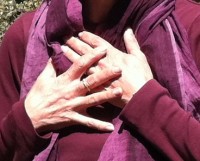Self-Compassion
 Self-Compassion is the willingness to observe our negative thoughts and emotions with openness and clarity or with mindful awareness, without criticizing or condemning our self.
Self-Compassion is the willingness to observe our negative thoughts and emotions with openness and clarity or with mindful awareness, without criticizing or condemning our self.
It is the ability to recognize our suffering, to name it, and to allow it.
According to Kristy Nuff, who did her dissertation on self-compassion, there are 3 components of self compassion:
1. Kindness: being warm and understanding towards ourselves when we are suffering rather than being judgmental or self-critical or ignoring our pain. This kindness is friendliness toward our self.
2. Common humanity: recognizing that our suffering and personal inadequacies are part of our shared human experience. And that all humans are imperfect. We are not going to get away with anything other than this imperfection. It is who we are.
3. Be mindful. Being present with what’s happening. Recognizing it and not pushing it away or discounting it.
Self compassion provides the emotional safety needed to mindfully open to our pain.
When we soothe our own pain we are tapping into our biological care giving system which:
Releases oxytocin
Decreases our cortisol levels
Increases heart rate variability
When we are kind to ourselves it releases oxytocin. Oxytocin is an amazing hormone in our system. It is the bonding hormone that makes us feel good. It’s the love hormone. It’s particularly present with mothers and newborns, and it’s particularly present in relationships and making love. It’s very present in orgasms and in childbirth itself. But it’s also even in shaking hands, in making eye contact and any kind of social engagement, including smiling. All these things increase and release oxytocin. Oxytocin feels good it’s an internal love drug.
Soothing our self also decreases our cortisol levels, Cortisol is a stress hormone that helps us run or fight when we are in danger.
Being kind to our self also increases our heart rate variability. Heart rate variability is an indicator of emotional balance. People who have a lot of heart rate variability are well balanced emotionally. So, the more open and expanded and safe you feel, the more heart rate variability you have. The people who do not have good heart rate variability are at risk of heart disease and heart attack.
